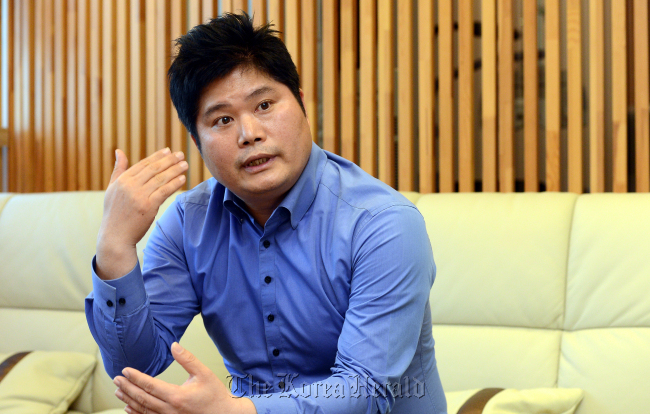When Johnson & Johnson Vision Care introduced its first daily disposable contact lenses in 1997, it didn’t know its next major product would be developed in Korea.
“Circle lenses produced by local makers became popular from around 2000, and we saw growth potential in the Asian market, so we made a proposal for research and development to our headquarters based on our own market research,” Chung Byung-heon, chief of JJVC’s Korean arm, told The Korea Herald.
 |
Chung Byung-heon, chief of JJVC’s Korean arm. (Ahn Hoon/The Korea Herald) |
“One-Day Acuvue Define circle lenses were released as a result, first in the Korean market in 2004.”
Acuvue Define was of higher quality compared to some circle lenses made by small and medium-sized companies in Korea which caused side effects. Unlike other lenses with tinted outer rims, Acuvue Define has the same oxygen transmission rate and the same specifications including thickness with other daily disposable contacts.
Nowadays, nearly half of the contact-lens-wearing population in Korea use circle lenses, and almost 70 percent of high school students who shift from glasses to contacts here choose the cosmetic contact lens that makes the eye’s iris appear larger.
Korea has also grown into JJVC’s fourth-largest market after the U.S., Japan and the U.K. JJVC’s sales reached $3 billion worldwide last year.
Since JJVC Korea developed most of the company’s beauty marketing business, many from the Korean team have been promoted to executives in the global or Asia Pacific headquarters. A Korean lady was promoted to lead new product development at the headquarters in Jacksonville, Florida, in 2011, and another became the new vice president of JJVC Asia Pacific in January.
“The annual contact lens market in Korea amounts to about 400 billion won, and Acuvue commands about 45 ($3 million) percent of it in terms of the number of customers,” Chung said.
Worldwide, Acuvue’s market share ranges between 33 and 35 percent.
JJVC Korea’s sales have shown a compound annual growth of over 20 percent and reached over 100 billion won for the first time in 2011 thanks to rigorous marketing.
“We do a lot of research on customer insight to find out which lenses the customers want the most and use most safely,” Chung said.
“Our products met their demands, so the market in general grew.”
When Chung, who worked at Nongshim Kellogg and Nestle Korea before joining JJVC in 1999, took the helm of the Korean unit in 2007, the firm was making about 35 billion won in sales a year and had 50 employees.
Over the next six years, its sales more than tripled to 120 billion won last year and employee number more than doubled. The company’s sales target this year is 150 billion won.
JJVC Korea also has 15 educating staff including two optometrists from Australia and New Zealand who teach local opticians about contact lenses ― their pros and cons, clinical studies on the different materials, the latest trends and corrective contacts for presbyopia.
JJVC also began its first free trial services through the Internet in Korea.
Some 700,000 people each year get to try wearing Acuvue contacts for a day or two, and many end up buying them, according to Chung.
“One of the most common and wrong myths about contacts is that you can’t wear them for more than 10 years,” Chung said.
“That was a long time ago, and now with high product quality, you can wear them forever. We educate customers about how to best use contacts through the Internet as part of our campaign for eye health.”
With between 60 and 70 percent of teenagers wearing corrective eyewear or contacts, consumer education is an important part of JJVC’s efforts to give back to society, he said.
Earlier this month, JJVC Korea was named the “Best Employer of the Year” by human resources consulting firm Aon Hewitt in recognition of its commitment to workers’ learning and growth.
JJVC Korea was awarded for receiving high scores in a survey on employee engagement, satisfaction and loyalty.
By Kim So-hyun (
sophie@heraldcorp.com)








